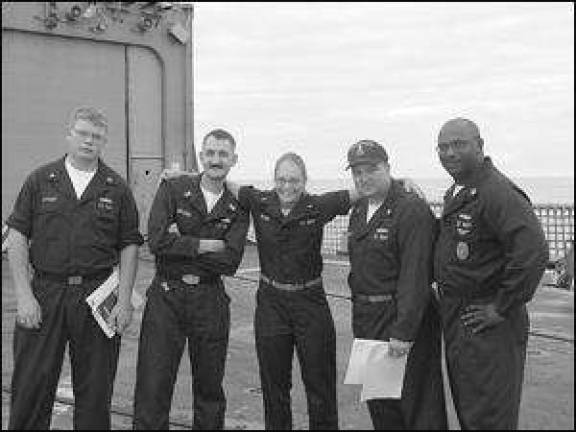Free spirit from Sugar Loaf finds peace in the military

Sugar Loaf Fallon Rossi remembers falling in love with Boston while visiting a friend during her junior year in high school. She vowed she would someday go to school there and eventually enrolled as a pre-med student at Boston University, excited about becoming a doctor. While on a trip to Nepal one semester, she studied family theories and domestic violence and decided that her talents would be better suited to social work and counseling. To save her parents the financial burden of paying her tuition, Rossi, who is from Sugar Loaf, joined the ROTC program. In ROTC, she was teased at first about her “hippie” jewelry and clothes, but once she proved herself a hard worker and a good student, she was placed in an administrative leadership role in charge of college students. She later brought these skills to the Navy, where she is in charge of young men on a frigate. At Boston University, Rossi took every course she could with a teacher who specialized in the subjects she studied in Nepal. When she exhausted her undergraduate classes with this teacher, she was recruited for a special research group. She thought the group would be focused on domestic violence but soon found out it was a world peace effort based on the theory that “we can never have world peace when the world is not at peace.” Her group researched people all over the world, and found that most do not believe peace is possible, that it is only an ideal. Some believe in the possibility of peace, but only if certain specific conditions are met. Rossi’s study group presented situations and pictures meant to evoke feelings and reactions that could be classified into quantifiable data regarding how people feel about war. The teacher who took over the group when Rossi went into the military after ROTC published a preliminary paper on the study in a newsletter on peace psychology. Rossi made a poster presentation on her findings at Tufts University. Rossi believes studying peace and being part of the military are not incongruent, as many might think. One of the favorite parts of her job is diplomacy, when she visits a foreign ship or hosts foreign military personnel on her ship. Once her ship hosted the Chinese Navy, which reciprocated by hosting the U.S. Navy. “Their administrators spoke of a friendly alliance and reached out with a friendly hand to try and promote peace between militaries,” she said. “People don’t see this. You don’t have to be a warmonger to be in the military. My job in the Navy is promoting peace.” Rossi, now 22, will be deployed for the first time overseas this summer. She has already been away from home for eight months while stationed in Hawaii, where she trained and worked aboard a ship. She recently came home for a short visit with her family and had many positive things to say about her experience. She has learned how to manage her time, how to multi-task, and how to write research papers. Rossi helps young men who are away from home for the first time and who are in the military either out of necessity or to get away from tough life situations. Although she is in charge of men older than she is, this has not been a problem for her because she is responsible for reviewing their performance. Although her job is stressful at times and she sometimes believes she has “bitten off more than she could chew,” she loves what she does and enjoys working with the men on the ship. “In a way, it is easier working with men because I do not feel compelled to be friends with them as I might with women,” she said. She feels fortunate to have come from a very loving family. Her father was in the Air National Guard and is now a technician on C5 aircraft. Her brother is in the ROTC Air Force. Her mother, Dorian De Han Rossi, an interior decorator in Sugar Loaf, says she is her hero. She helped her daughter face a job like this by telling her early on that she “can’t take the world’s burdens on herself.” Hearing some of the terrible situations that the young people she counsels with come from, Rossi feels she is better able to help them by not pitying them. After looking through their files and reading their biographies, she decides what therapies will be most effective for each. The best way, she said, is to treat all people “like normal.” “If kids at school looked at them with pity, they don’t need their counselors looking at them with pity, too,” Rossi said. For the present, Rossi will go where the military tells her she must go. At 22, she cannot say for sure what she will do for the rest of her life. But she does look forward to a time when she can do even more to help others, one person at a time.